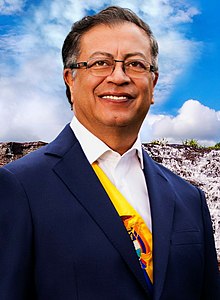Gustavo Petro | |
|---|---|
 Official portrait, 2022 | |
| 34th President of Colombia | |
| Assumed office 7 August 2022 | |
| Vice President | Francia Márquez |
| Preceded by | Iván Duque |
| Senator of Colombia | |
| In office 20 July 2018[a] – 20 July 2022 | |
| In office 20 July 2006 – 20 July 2010 | |
| Mayor of Bogotá | |
| In office 23 April 2014 – 31 December 2015 | |
| Preceded by | María Mercedes Maldonado (acting) |
| Succeeded by | Enrique Peñalosa |
| In office 1 January 2012 – 19 March 2014 | |
| Preceded by | Clara López (acting) |
| Succeeded by | Rafael Pardo (acting) |
| Member of the Chamber of Representatives | |
| In office 20 July 1998 – 20 July 2006 | |
| Constituency | Capital District |
| In office 1 December 1991 – 20 July 1994 | |
| Constituency | Cundinamarca |
| Personal details | |
| Born | Gustavo Francisco Petro Urrego 19 April 1960 Ciénaga de Oro, Córdoba, Colombia |
| Political party | Humane Colombia (2011–present) |
| Other political affiliations | M-19 Democratic Alliance (1990–1997)[b] Alternative Way (1998–2002) Regional Integration Movement (2002–2005) Alternative Democratic Pole (2005–2010) Historic Pact for Colombia (2011–present) |
| Spouses | Katia Burgos
(m. 1986; div. 1992)Mary Luz Herrán
(m. 1992; div. 2000) |
| Children | 6, including Nicolás and Sofía |
| Alma mater | Externado University of Colombia Graduate School of Public Administration Pontifical Xavierian University (Not finished) University of Salamanca Université catholique de Louvain |
| Signature | |
| Website | gustavopetro |
Gustavo Francisco Petro Urrego[c] ODB ODSC ODIC (Latin American Spanish: [ɡusˈtaβo fɾanˈsisko ˈpetɾo wˈreɣo]; born 19 April 1960) is a Colombian politician who is the 34th and current president of Colombia since 2022. Upon inauguration, he became the first left-wing president in the recent history of Colombia.[1][2]
At 17 years old, Petro became a member of the guerrilla group 19th of April Movement (M-19), which later evolved into the M-19 Democratic Alliance, a political party. Petro also served as a councilman in Zipaquirá, but was arrested and tortured by the army for his affiliation with the M-19. After the peace process between the Colombian government and the M-19, he was released and then elected to the Chamber of Representatives in the 1991 Colombian parliamentary election. Some years later, he was elected to the Colombian Senate as a member of the Alternative Democratic Pole (PDA) party following the 2006 Colombian parliamentary election, where he secured the second-largest vote. In 2009, he resigned his Senate seat to run in the 2010 Colombian presidential election, finishing fourth.[3] He was elected mayor of Bogotá in 2011, the second most important elected office in Colombia, and held the post until 2015.[4]
Due to ideological disagreements with the leaders of the PDA, he founded the Humane Colombia movement to compete for the mayoralty of Bogotá. On 30 October 2011, he was elected mayor in the local elections, a position he assumed on 1 January 2012.[5] In the first round of the 2018 Colombian presidential election, he came second with over 25% of the votes on 27 May, and lost in the run-off election on 17 June.[6] He defeated Rodolfo Hernández Suárez in the second round of the 2022 Colombian presidential election on 19 June.[7]
Cite error: There are <ref group=lower-alpha> tags or {{efn}} templates on this page, but the references will not show without a {{reflist|group=lower-alpha}} template or {{notelist}} template (see the help page).
- ^ Semana.com. "Gustavo Petro Urrego: hoja de vida del candidato de 'Colombia Humana'". Gustavo Petro Urrego: hoja de vida del candidato de 'Colombia Humana'. Archived from the original on 20 June 2022. Retrieved 25 March 2022.
- ^ "¿Quién es Gustavo Petro? Perfil del candidato de la izquierda en Colombia". CNN. 14 March 2022. Archived from the original on 7 June 2022. Retrieved 25 March 2022.
- ^ "Gustavo Petro, Colombia's unorthodox left-wing presidential candidate". www.efe.com. Archived from the original on 21 April 2022. Retrieved 27 March 2022.
- ^ "Former Colombian rebel elected mayor of capital, Bogota". BBC News. 4 October 2012. Retrieved 2 October 2024.
- ^ "The former Colombian revolutionary leader was elected mayor of capital, Bogota". BBC News. 31 October 2011. Archived from the original on 20 June 2022. Retrieved 20 June 2018.
- ^ Parkin, Joe (18 June 2018). "Iván Duque wins election to become Colombia's president". The Guardian. Archived from the original on 20 June 2022. Retrieved 27 March 2022.
- ^ Carlsen, Laura; Dickinson, Elizabeth; Dimitroff, Sashe; Guzmán, Sergio; Molina, Marco; Shifter, Michael; Velez de Berliner, Maria (21 June 2022). "What Will Petro's Presidency Mean for Colombia?". The Dialogue. Inter-American Dialogue. Archived from the original on 21 June 2022. Retrieved 25 June 2022.